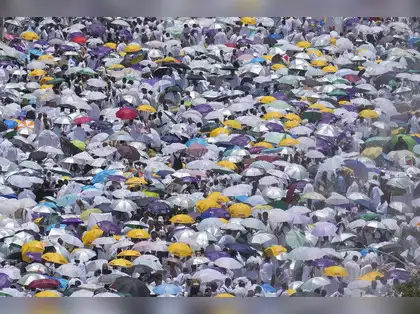Says deal is in effect after initial hiccups
Dubai: US President Donald Trump said a ceasefire between Iran and Israel was in effect Tuesday after the deal initially faltered, and the American leader expressed deep frustration with both sides.
Israel had earlier accused Iran of launching missiles into its airspace after the truce was supposed to take effect, and the Israeli finance minister vowed that “Tehran will tremble.”
The Iranian military denied firing on Israel, state media reported, but explosions boomed and sirens sounded across northern Israel in the morning, and an Israeli military official said two Iranian missiles were intercepted.
Trump told reporters at the White House before departing for a NATO summit that, in his view, both sides had violated the nascent agreement. He had particularly strong words for Israel, a close ally, while suggesting Iran may have fired on the country by mistake.
But later he said the deal was saved.
“ISRAEL is not going to attack Iran. All planes will turn around and head home, while doing a friendly “Plane Wave” to Iran. Nobody will be hurt, the Ceasefire is in effect!” Trump said in his Truth Social post.
Indeed, Israeli Prime Minister Benjamin Netanyahu’s office said he held off on tougher strike against Iran after speaking to Trump.
The conflict, now in its 12th day, began with Israel targeting Iranian nuclear and military sites, saying it could not allow Tehran to develop atomic weapons and that it feared the Islamic Republic was close. Iran has long maintained that its programme is peaceful.
Many worried the war might widen after the US joined the attacks by dropping bunker-buster bombs over the weekend and Israel expanded the kinds of targets it was hitting.
But after Tehran launched a limited retaliatory strike on a US military base in Qatar on Monday, Trump announced the ceasefire.
The deal got off to a rocky start.
An Israeli military official who spoke on the condition of anonymity in line with military regulations said Iran launched two missiles at Israel hours into the tenuous ceasefire. Both were intercepted, the official said.
Iranian state television reported that the military denied firing missiles after the start of the ceasefire — while condemning Israel for predawn strikes of its own.
One of those attacks killed a high-profile nuclear scientist, Mohammad Reza Sedighi Saber, at his father-in-law’s residence in northern Iran, Iranian state TV reported.
As Trump spoke to reporters at the White House before departing for the NATO summit, he expressed disappointment with both sides.
Iran “violated it, but Israel violated it too,” Trump said. ”I’m not happy with Israel.”
Trump’s frustration was palpable, using an expletive to hammer home his point.
“We basically have two countries that have been fighting so long and so hard that they don’t know what the f—- they’re doing,” he said.
Later, however, he announced that Israel had backed off its threat to attack Tehran and would turn its jets around.
Netanyahu’s office said Israel struck an Iranian radar site in response to the Iranian missile attack early Tuesday, but Israeli forces held off on something bigger.
Following Trump’s conversation with Netanyahu, “Israel refrained from additional attacks,” Netanyahu’s office said.
Netanyahu said Israel agreed to a bilateral ceasefire with Iran, in coordination with Trump, after the country achieved all of its war goals, including removing the threat of Iran’s nuclear and ballistic missile programmes.
It’s unclear what role Ayatollah Ali Khamenei, Iran’s leader, played in the talks. He said earlier on social media that he would not surrender.
Trump said Tuesday that he wasn’t seeking regime change in Iran, two days after floating the idea himself in a social media post.
“I don’t want it,” Trump told reporters on Air Force One. “Regime change takes chaos and, ideally, we don’t want to see much chaos.”
Before the ceasefire was announced, Israel’s military said Iran launched 20 missiles toward Israel. Police said they damaged at least three densely packed residential buildings in the city of Beersheba. First responders said they retrieved four bodies from one building and were searching for more. At least 20 people were injured.
Outside, the shells of burned out cars littered the streets. Broken glass and rubble covered the area. Police said some people were injured while inside their apartments’ reinforced safe rooms, which are meant to withstand rockets but not direct hits from ballistic missiles.
The attack followed a limited Iranian missile attack Monday on a US military base in Qatar, retaliating for earlier American bombing of its nuclear sites. The US was warned by Iran in advance, and there were no casualties.
Drones attacked military bases in Iraq overnight, including some housing US troops, the Iraqi army and a US military official said Tuesday.
A senior US military official, who spoke on condition of anonymity because he was not authorised to comment publicly, said US forces shot down drones attacking Ain al-Assad in the desert in western Iraq and at a base next to the Baghdad airport, while another one crashed.
No casualties were reported, and no group claimed responsibility for the attacks in Iraq. Some Iran-backed Iraqi militias had previously threatened to target US bases if the US attacked Iran.
In Israel, at least 28 people have been killed and more than 1,000 wounded in the war. Israeli strikes on Iran have killed at least 974 people and wounded 3,458 others, according to the Washington-based group Human Rights Activists.
The group, which has provided detailed casualty figures from Iranian unrest, said of those killed, it identified 387 civilians and 268 security force personnel.
The US has evacuated some 250 American citizens and their immediate family members from Israel by government, military and charter flights that began over the weekend, a State Department official said.
There are roughly 700,000 American citizens, most of them dual US-Israeli citizens, believed to be in Israel.
India welcomes Iran-Israel ceasefire; urges for peace through dialogue, diplomacy
India has expressed concern over the recent escalation in West Asia and welcomed reports of a ceasefire between Iran and Israel, while urging all parties to pursue dialogue and diplomacy to resolve regional tensions.
In an official statement released on Tuesday, the Ministry of External Affairs (MEA) said, “We have been following developments overnight relating to the conflict between Iran and Israel, including the US action against Iran’s nuclear facilities and Iranian retaliation against US military bases in Qatar.”
While noting the seriousness of the situation, the MEA emphasised the need for long-term regional peace. “While we remain deeply concerned about the prospects for overall and sustained regional security and stability, we welcome reports of a ceasefire between Iran and Israel and the role played by the US and Qatar in bringing it about.”
Reiterating India’s longstanding position on conflict resolution, the statement added, “We wish to reiterate that there is no alternative to dialogue and diplomacy in order to address and resolve the multiple conflicts in the region.”
India also affirmed its willingness to contribute to peace-building efforts, stating, “India stands ready to play its part in these efforts and hopes that all concerned parties will work towards sustained peace and stability.” (Agencies)
Trump ceasefire plan falters as Israel says Iran launched more missiles, pledges response
A tentative truce proposed by President Donald Trump hung in the balance as Israel said Iran had launched missiles into its airspace less than three hours after a ceasefire went into effect and vowed to retaliate.
Explosions boomed and sirens sounded across northern Israel midmorning on Tuesday, after both Israel and Iran on Tuesday accepted the ceasefire plan to end the 12-day war roiling the Middle East.
Israeli Defence Minister Israel Katz called the missiles a violation of the ceasefire and instructed Israel’s military to resume “the intense operations to attack Tehran and to destroy targets of the regime and terror infrastructure.”
The shaky agreement was announced early Tuesday morning after Tehran launched a retaliatory limited missile attack on a U.S. military base in Qatar on Monday.
Between Trump’s post and the start of the ceasefire, Israel launched a blitz of airstrikes targeting sites across Iran before dawn and Iran replied with an onslaught of missiles that killed at least four people in Israel early Tuesday morning.
Israel said it had intercepted the midmorning barrage of missiles that came hours into the truce.
“Tehran will tremble” Israel’s Finance Minister Betzalel Smotrich wrote on X after the missiles were launched.
Iranian state television reported that the ceasefire went into effect at 7:30 a.m., but Iranian officials have not commented since Trump’s announcement. Hours earlier Iran’s top diplomat said the country was prepared to halt airstrikes.
“As of now, there is NO agreement’ on any ceasefire or cessation of military operations,” Iranian Foreign Minister Abbas Araghchi wrote in a post on X. “However, provided that the Israeli regime stops its illegal aggression against the Iranian people no later than 4 am Tehran time, we have no intention to continue our response afterwards.”
Trump’s announcement that Israel and Iran had agreed to a “complete and total ceasefire” came soon after Iran launched a limited missile attack Monday on a US military base in Qatar, retaliating for the American bombing of its nuclear sites. The US was warned by Iran in advance, and there were no casualties.





